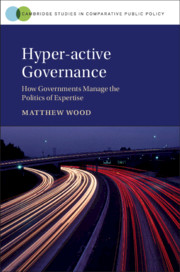Book contents
- Hyper-active Governance
- Cambridge Studies in Comparative Public Policy
- Hyper-active Governance
- Copyright page
- Contents
- Figures
- Tables
- Boxes
- Preface
- Acknowledgements
- Abbreviations
- Part I Introducing Hyper-active Governance
- Part II Hyper-active Governance in Practice
- Part III Theorising Hyper-active Governance
- 7 Frenetically Standing Still
- 8 Experts, Politics and Co-Production
- Book part
- Notes
- References
- Index
7 - Frenetically Standing Still
Hyper-active Governance and Social Acceleration
from Part III - Theorising Hyper-active Governance
Published online by Cambridge University Press: 21 June 2019
- Hyper-active Governance
- Cambridge Studies in Comparative Public Policy
- Hyper-active Governance
- Copyright page
- Contents
- Figures
- Tables
- Boxes
- Preface
- Acknowledgements
- Abbreviations
- Part I Introducing Hyper-active Governance
- Part II Hyper-active Governance in Practice
- Part III Theorising Hyper-active Governance
- 7 Frenetically Standing Still
- 8 Experts, Politics and Co-Production
- Book part
- Notes
- References
- Index
Summary
This book has shown that experts widely assumed to have been given much autonomy over governance over the past three decades are in fact intimately linked to the state. Governments defend them from public attack (see Chapter 3), empower them with more resources to fight crises (Chapter 4) and include a wider range of ‘experts’ in their working (Chapter 5). Successful areas of public policy widely claimed to be the domain of experts – monetary policy and electoral administration specifically – are designed to be closely connected with, and steered by, public authorities. This chapter turns to the theoretical implications of this argument and, in particular, delves deeper into explaining the ‘pathological’ aspects of the case studies, noted in Chapters 3–5.
- Type
- Chapter
- Information
- Hyper-active GovernanceHow Governments Manage the Politics of Expertise, pp. 192Publisher: Cambridge University PressPrint publication year: 2019

